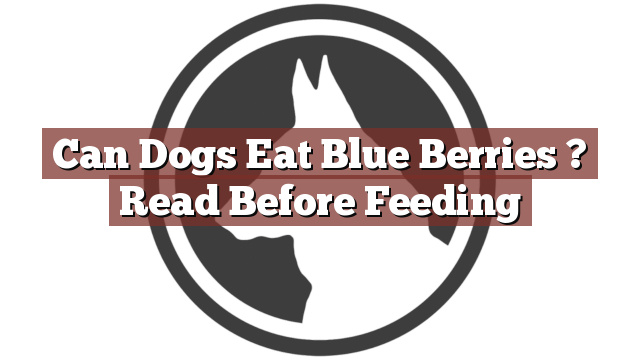Understanding Your Dog’s Dietary Needs
As a responsible pet owner, it is crucial to understand your dog’s dietary needs to ensure their overall health and well-being. Providing a balanced and nutritious diet is essential for your dog to thrive. While dogs primarily thrive on a diet of meat, it is essential to incorporate certain fruits and vegetables into their diet to provide them with additional vitamins and minerals. However, not all fruits and vegetables are safe for dogs to consume. It’s crucial to be aware of what foods are safe and beneficial for your furry friend.
Can Dogs Eat Blueberries? Read Before Feeding
Can dogs eat blueberries? The answer is a resounding yes! Blueberries are not only safe for dogs to consume but can also offer various health benefits. Packed with antioxidants, vitamins, and fiber, these tiny berries can be a healthy addition to your dog’s diet. Blueberries are low in calories and fat, making them an excellent option for dogs who are on a weight management plan. They also contain a good amount of vitamin C, vitamin K, and manganese, all of which are beneficial for your dog’s overall health.
Pros and Cons of Feeding Blueberries to Your Dog
Feeding blueberries to your dog can bring several benefits to their health. One of the significant advantages is the high antioxidant content found in blueberries. Antioxidants help combat free radicals in your dog’s body, reducing the risk of chronic diseases and boosting their immune system. Additionally, the fiber present in blueberries can promote healthy digestion and prevent constipation in your furry friend.
However, it’s important to note that blueberries should be given in moderation. While they are generally safe, excessive consumption may cause digestive issues such as diarrhea or upset stomach. It’s always best to introduce new foods gradually into your dog’s diet to monitor their reaction and ensure they tolerate it well. Furthermore, it’s crucial to wash blueberries thoroughly and remove any potential stems or leaves before feeding them to your dog.
Conclusion: Blueberries Can Be a Healthy Addition to Your Dog’s Diet
In conclusion, the answer to the question "can dogs eat blueberries?" is a definite yes. Blueberries can provide numerous health benefits for your furry friend when given in moderation. The high antioxidant content, along with the vitamin and fiber content, makes blueberries a nutritious choice for your dog. However, it’s essential to introduce new foods gradually and monitor your dog’s reaction to ensure they tolerate it well. As always, consult with your veterinarian if you have any concerns or questions regarding your dog’s diet. With proper care and attention, blueberries can be a healthy and tasty addition to your dog’s diet.
Thank you for taking the time to read through our exploration of [page_title]. As every dog lover knows, our furry friends have unique dietary needs and responses, often varying from one canine to another. This is why it's paramount to approach any changes in their diet with caution and knowledge.
Before introducing any new treats or making alterations to your dog's diet based on our insights, it's crucial to consult with a veterinarian about [page_title]. Their expertise ensures that the choices you make are well-suited to your particular pet's health and well-being.
Even seemingly harmless foods can sometimes lead to allergic reactions or digestive issues, which is why monitoring your dog after introducing any new food item is essential.
The content provided here on [page_title] is crafted with care, thorough research, and a genuine love for dogs. Nevertheless, it serves as a general guideline and should not be considered a substitute for professional veterinary advice.
Always prioritize the expert insights of your veterinarian, and remember that the health and happiness of your furry companion come first.
May your journey with your pet continue to be filled with joy, love, and safe culinary adventures. Happy reading, and even happier snacking for your canine friend!

